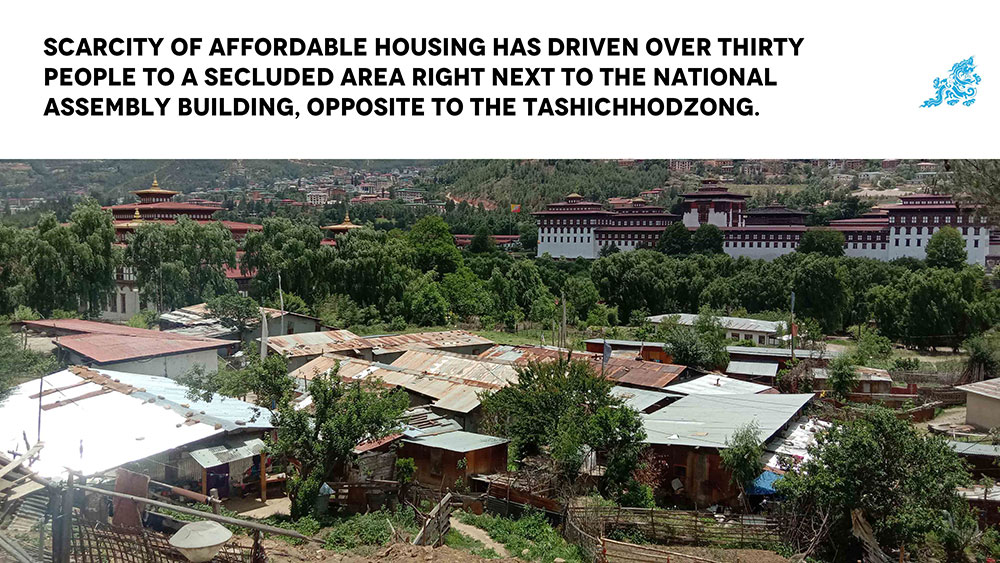Langjophakha, Thimphu—Dolma’s home in summer is very hot and smells of mould. Here, among Bhutan’s most significant buildings, Dolma lives in a two-roomed house made of old CGI sheets. For more than two decades, until her superannuation last month, she maintained the gardens surrounding the Parliament building and raised five children.
Dolma, 56, is from Thimphu. She left her village in her teens and started working for the Department of National Properties (DNP) as a gardener.
Scarcity of affordable housing in the capital has pushed Dolma and 30 of her colleagues to a secluded area right next to the National Assembly building, opposite to Tashichhodzong.
In less than half an acre land below the road, 30 households with a minimum of five members are crammed in where they struggle for basic necessities such as water, sanitation, and safe environment.
“Our water taps have been dry for two weeks. We collect water from nearby areas at night and early morning,” says Dolma, who is now jobless and uncertain about the future with just Nu 200,000 from her retirement.
Despite being on contract, many workers in the group have relocated from other dzongkhags decades ago drawn by free housing provided by DNP. A number of them from the east had fled harsh conditions in the countryside.
Dorji Dema has been unwell for the past few days. Her house, made from bamboo is located farthest away from the public toilet she shares with six other households. Without constant water supply, the families depend on rainwater during monsoon. “We cannot maintain cleanliness.”
She washes the clothes once a week.
Thinley Pelzom recalls instances of arguments and fights among households about cleaning the washrooms.
Dorji Dema’s mother who recently came from Tashiyangtse to care for daughter is concerned. She said she was suffocated by the lack of sanitation and feared threat from fire hazards.
At the site, Kuensel found the issue of rampant littering. Without proper drainage systems and water supply, there is a stench from the nearby marshy areas formed by waste water discharge. In summer, this is a breeding ground for mosquitoes.
In 2019, fire outbreak in settlement and burned down four houses. None of the items could be saved. Dolma lost one of her rooms to the fire.
She recalls being away from her home and running to save her son, who was sleeping. “We live in constant fear but we have no other alternatives.”
Kuchum, a gardener with DNP, has a daughter who stays home to ensure that the house is safe. She said that when the family goes out, the main switch is put off and LPG pressure regulator checked to prevent fires.
Due to poor materials used for building the houses, resisting extreme weather has become difficult. The houses are either built from old CGI sheets, bamboos, or tins. Dolma has painted her home white to reflect the sun’s rays in summer. “As I get older, cold winters are difficult. Heater cannot warm the house. I have installed a bukhari – wood stove.”
But then, getting firewood has become more challenging.
Kuchum’s six family members stay out of the house in the afternoons during summer.
Despite these situations, this place has become a source of income for many generations. Tshetenla, after working for 30 years with DNP, was replaced by his daughter. Monthly, she earns Nu 10,000 and supports her four family members.
No one knows who built these structures. Dorji Dema who relocated to the area in 2004 said that the area was used as a labour campsite in the past while constructing the Parliament buildings. “People continued to flock in since it was rent free.”
Thinley Pelzom, who had been staying in the area for 15 years said that there was no development of facilities. “Maybe it is the price we pay for having access to free housing.”
Recently, there was a rumor that these houses would be relocated. This has left many of them worried.
Dolma said that she had nowhere to go. “I cannot afford to pay rent in Thimphu. It is beyond my means.”
Sonam Dema, who also works with the DNP, said that she was told by her bosses not to grow vegetables because they would go to waste when the new construction of foreign ministry starts.
“We are told that we will be relocated. But we know nothing about the decision,” she said.
Sherab Zangmo, gardener with DNP, hopes that the government would provide them free housing elsewhere.
However, a source with the relevant agency said that there were no plans for relocation. “They are low-income families and have nowhere else to go.”
By Choki Wangmo
Edited by Jigme Wangchuk


